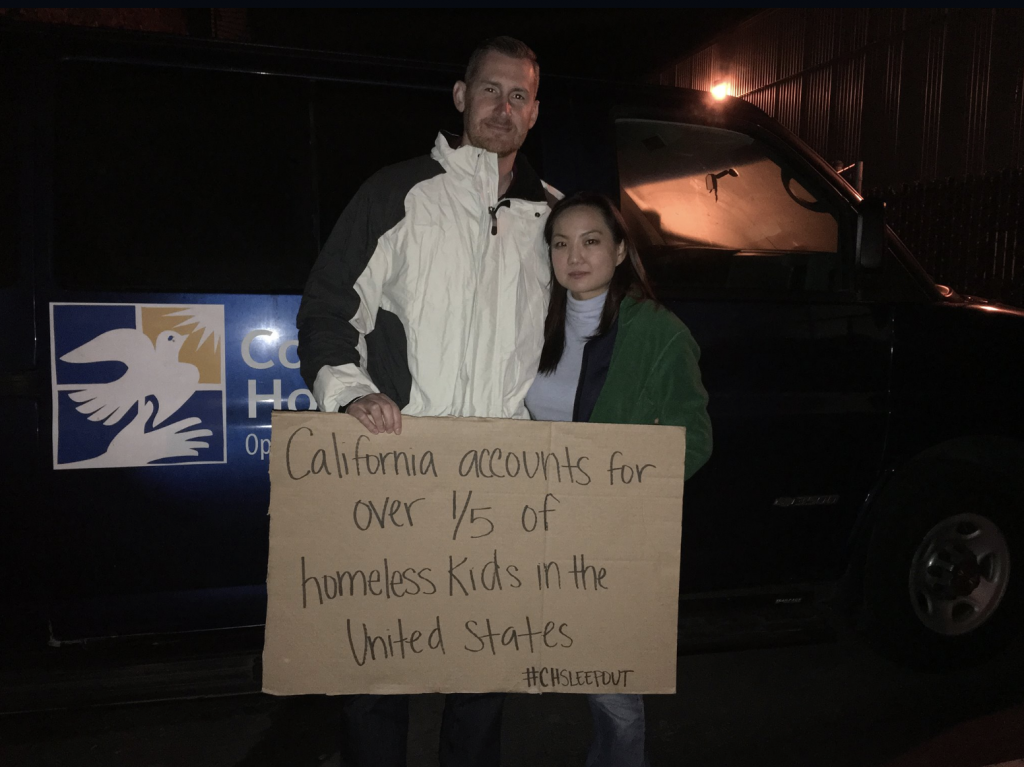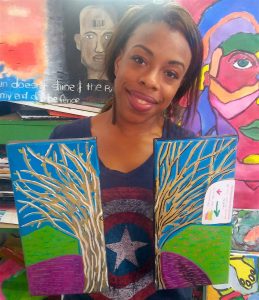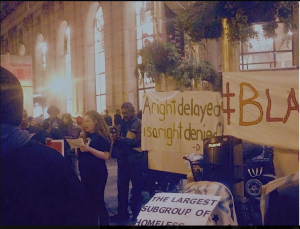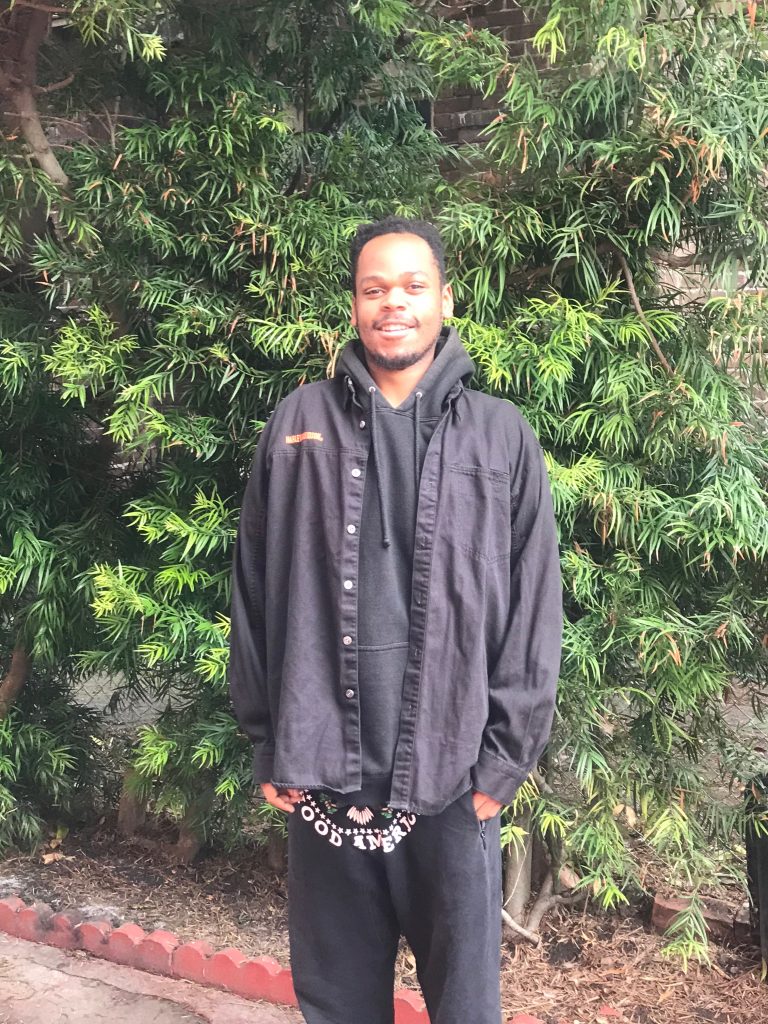
The reality is that many young people are fighting the conditions of homelessness when we’re still works in progress. But we are more than statistics.
By Justin Jones
Editor’s note: This story was produced in partnership with Street Spirit, a street media paper in Berkeley, California, and is part of “The Right to a Home,” a Community Based News Room (CBNR) series that examines homelessness issues across the United States. CBNR is a project of Law@the Margins, and the series is supported by a Solutions Journalism Network grant.
BERKELEY, California — I became homeless at the age of 8 or 9 after my mom enrolled in a 90-day rehab program. My dad was a part of the problem and wasn’t present after she took the steps to a better life. While she was there, my grandma’s sister moved into our apartment to take care of my older brother and me. But when my mom got back, we moved into a family shelter in Berkeley.
After that, we never really stayed anywhere for longer than a year. We stayed in most of the family shelters in Berkeley, such as Sankofa, which was specifically for women with children. After moving through those, we started living with family friends. It’s hard to keep track of how many places I’ve lived.
I am one of the homeless youth living in California. The reality is that many young people are fighting the conditions of homelessness when we’re still works in progress. According to the 2019 Point-in-Time count, California is home to 12,396 unaccompanied homeless youth between the ages of 18 and 25 — one- third of the nation’s total.

In Berkeley, 225 such youth were counted in 2019. YEAH!, an emergency youth homeless shelter program in Berkeley, reports the demographics: three-quarters male, 54 percent Caucasian, 85 percent local, 73 percent active drug or alcohol users, 36 percent with mental health problems, half are not high school graduates, and 79 percent have no source of income. Couch surfing youth are not counted under the United States Department of Housing and Urban Development (HUD) definition of homelessness. Advocates suggest that when accounting for that demographic, the number of unhoused youth in Berkeley hovers around 400.
But I am more than a statistic.
I graduated from Berkeley High School in the Class of 2015. This moment was a high point for my family. It was exciting for me as well. But despite the people in the crowd at Berkeley’s Greek Theater, clapping and hoping the best for all of the graduates that day, a high school diploma did not change my conditions.
Not long after, I moved out on my own. Splitting up was the best financial option left for my mom and me. It was cheaper for each of us to rent a room somewhere than to find a place together. I ended up couch surfing with a friend who lived in foster care in Oakland. Five or six months flew by. I enrolled in the fall semester at Berkeley City College, but I had no clear vision of where I was going. Finally, they notified my friend that she would lose her housing if I didn’t leave. I never intended for my friend’s housing to be jeopardized, so I knew I had to go.

One of the on-site staff members at my friend’s foster care helped me get a bed at a place called Turning Point — a transitional housing program in Berkeley for homeless youth between the ages of 18 and 25. It is one of only three transitional housing programs for youth in Alameda County (Covenant House and East Oakland Community Project are the others). In order to be eligible for the waiting list, I had to prove I had stayed in a shelter before. So I spent a night at a shelter in Oakland. I paid five dollars for an overnight stay, food and a chance to shower.
The experience was highly triggering and uncomfortable for me. After growing up in shelters, it didn’t feel great to wind up back in a shelter. I was 18, and everyone else was in their 40s and 50s. It was heartbreaking to see those other people. I was fighting the fear of shelter living becoming a constant in my own life.
“There’s lots of trauma and lots of mental health concerns or symptoms that get exacerbated by being homeless,” says Kellie Knox, the project director at the Fred Finch Youth Center, which runs Turning Point. “And also lack of stability. A lot of people have been so many places it’s hard to get your life together when you’re constantly moving around.”

I moved into Turning Point in March 2016. It was two or three months before I unpacked my things. In every living situation, I resist unpacking because part of me doesn’t know how long I’m going to be there.
Eventually, I did unpack. As a resident, I had access to more than enough resources. I got to see a therapist, a financial adviser, and attend big group meetings. It felt more like a boarding school or a dorm situation than a shelter. I ran into a couple of people that I already knew, which made it a lot more comfortable to be there. And the services did help.
All of the meetings were mandatory. They encouraged us to learn how to budget and helped residents set up savings. There was staff who could help you figure out what you wanted to do for work and a bulletin board with job listings in a common area. And my therapist was pretty cool. I finally had the chance to talk to somebody who hadn’t been involved with everything I had been going through since graduating high school.
I was not alone in feeling this way.

Mary Stackiewicz is another former resident of Turning Point. When she was 18, her parents died, and she moved in with family members. Later on, one of her guardians died. The other kicked her out. At that point, she became homeless. Then, she found her way to Turning Point.
“I found the services there very helpful,” recalls Stackiewicz. “I was taking advantage of the housing resource [a weekly meeting where a staff member would pass out applications for subsidized housing].” When Mary’s time Turning Point came to an end, staff helped her navigate Impact Hub, Berkeley’s coordinated entry system for homeless people. Through the Hub, they found her permanent housing.
That’s one of the limitations of Turning Point. Residents are only allowed to stay there for up to a year. Even though I always knew it would be temporary, I never got used to the adjustment that this was the next step, and that I would soon have to take control of my own future.
That’s the thing about homelessness. Housing services like Turning Point are time-based, and poor people don’t have time for forward-thinking and planning. This is especially hard for youth.

I didn’t have a clear definition of myself. Not having a sense of home causes youth dealing with homelessness to get attached to feelings of comfort. You get attached to friends and other people to make up for feeling isolated. If you can’t escape loneliness, you deal by escaping the anxiety of your circumstances. For me, I was skipping class to smoke weed, experiment with mild drugs, and hang out with friends. This is common for homeless youth. Some studies say that up to 81 percent of homeless youth experiencing homelessness use drugs or alcohol. I felt like I had no distinct focus.
When I realized I only had six months left at Turning Point, I started to turn my attention to finding housing and a job. Turning Point has a bulletin board of low-cost Craigslist postings for housing. My budget was $500-$600 per month. I ended up trying all the listings on the board. For a long time, I had no luck. I either got no response, a fake response, or was told that the room was taken.
This was also a struggle for the other youth at Turning Point. As time went by, people’s time there ran out. The staff did the best they could to check in and ask how the housing search was going, but that didn’t change the fact that they had to rotate the current residents with others in need. Only one or two people secured housing that I knew of. They found a place to rent, or family came around. The other people ended up just going back out to the streets.
According to Turning Point, during the 2018-2019 fiscal year, the program served 19 youth. Of this group, 82 percent exited to permanent housing situations. Additionally, 60 percent of youth who entered the program with no income exited with some sort of income, and 55 percent of youth who exited left with competitive employment.

I got a job at a dog daycare, which was right down the street from the sublet in West Oakland for $825 per month. It was surreal to have my own room and pay rent. But in order to make enough money for rent, I took a step back from school. The shift was strange. It felt as if I was playing tug of war with my future and the choices I had to make to meet immediate needs.
The difficulty that I was having was moving forward from what I had been through. The weight of being on my own and building a future for myself was heavy. The definition of what it means to plan for the future never set in for me. Navigating from my first step out of the shelter, as well as wanting to “keep up” with the same people I sat with on graduation day was clashing. Craving some sense of normality made life itself feel like a never-ending race.
Many homeless young people share this experience.
“Not being able to shower, so you weren’t exactly clean for your job every day. Not being able to eat every day. Having to find places that give out free food and hoping you don’t work during those hours. Finding a way to get on public transportation without paying the full price,” says Stackiewicz, describing the daily struggle of youth homelessness. “[For some people], finding the things they want to do that help them survive, they don’t really have the means to do it. I feel like that’s a huge impact.”
I had the opportunity to dictate my life, but got comfortable in the short-term accomplishment of having my own room. I didn’t change up what I was giving myself, though, and was reaching burnout. My burnout pushes me toward always wanting to escape where I am at whatever cost. I always get this pent- up energy, that I wanted something different, but didn’t know the steps it took to get it.
At some point, this pent-up energy came to a head, and I quit my job after about a year. I had this idea that I wanted to take a road trip and do a video documentary called “Where Did I Go?” around the U.S. It sounded more fun than working at a dog daycare, but I lacked the overall in- between plan for where I was and how I intended to make it happen.

But before I could plan the trip, I got kicked out of my housing for drinking in my room with a friend. I packed a backpack’s worth of stuff and got on a BART train to Berkeley. I slept outside in the hills that night, up by the rose garden. When I woke up in the morning, I had to find a new place to live.
For the last two years, I’ve been staying with a friend’s family in Berkeley. I am working and helping them pay rent. It’s hard to figure out where I want to go from here. My brother recently moved in with us, and I took an extra job to pay his portion of the rent, to make sure he doesn’t have to be out on the street or bounce around like we’ve always done.
It’s a familiar journey.
“I tell them when they get here. This isn’t where you land. This is just where you rest while we figure it out,” said Dwayne, a shelter coordinator at DreamCatcher Youth Services in Oakland, on the organization’s website. “For most, it feels like a landing, and when they leave, it is because that landing was soft enough to let them rest unbruised and unbroken until they were able to start ‘figuring it out.’ “
I am doing my best to figure things out. When I think about the future, it revolves around wanting a house where I can invite my friends and family. It’ll be me achieving the little things, but they will be the greatest achievements from my position.
That’s what comes to mind when I think about the future.
Justin Jones is a 22-year-old who lives in Berkeley, California.
Alastair Boone, editor of Street Spirit, assisted with the research and writing of this story.
Community Based News Room publishes the stories of people impacted by injustice and aspiring for change. Do you have a story to tell? Please contact us at CBNR. To support our Community Based News Room, please donate here.





